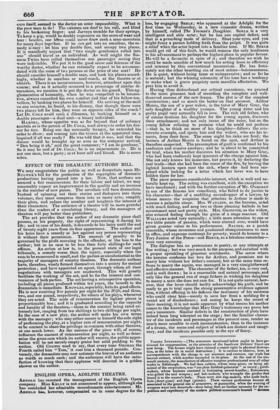ENGLISH OPERA, ADELPHI THEATRE.
ARNOLD has resumed the management of the English Opera company. Miss KELLY is not announced to appear, although she has concluded her admirable monodramatie entertainment. Mr. ARNOLD has, however, compensated us in some degree for the
loss, by engaging Sims; who appeared at the Adelphi for the first time on Wednesday, in a new domestic drama, written
by himself, called The Yeoman's Daughter. SMILE is a very intelligent and able actor; but he has one capital defect, and that is a preaching mode of delivery. Shut your eyes, and you might fancy a parson holding forth from the pulpit. It was quite
a relief when the actor lapsed into a familiar tone. if Mr. SERLE would get rid of this fault, he would remove the only hindrance
to his advancement to perhaps the highest place in popular favour. He will be a favourite in spite of it ; and therefore we wish he could be made sensible of how much his acting loses in efficiency and interest by this conventional mannerism. He has fortu- nately not the other besetting sin of most actors—boisterousness. He is quiet, without being tame or unimpressive; and so far he is natural ; but the whining solemnity of his tone has a tendency to make what is grave propriety seem maudlin affectation. We pray him to avoid it.
Having thus disburdened our critical conscience, we proceed to the more pleasant task of recording the complete and well- deserved success of the new drama. The plot is of the simplest construction; and so much the betteron that account. Arthur Morris, the son of a poor widow, is the tutor of Mary Gray, the only daughter of a wealthy yeoman. The young tutor and his pretty pupil very naturally fall in love. The rich old father, who of course destines his daughter for the young squire, discovers their attachment; and not only turns oil' the tutor, but on the young fellow refusing to promise what he could not perform —that is, to think no more of his daughter—follows the aris- tocratic example, and ejects him and the widow, who are his te- nants, from their farm. The same night his ricks are fired; the lantern of Arthur Morris is found on the spot, and Arthur is therefore suspected. The presumption of guilt is confirmed by his confusion and evasive answers; and he is about to be committed for trial, when his mother discovers his situation to Mary Gray, who had been studiously kept ignorant of the charge against him.
She not only knows his innocence, but proves it, by declaring the real truth—that she had been the cause of the fire, by leaving the lighted lantern open near the rick, where she had been sur- prised while looking for a letter which her lover was to have hidden there for her.
The piece possesses considerable interest, which is well and na- turally kept up. The acting was excellent, with the exception we have mentioned ; and with the further exception of Mr. OXBERRY (a son of the famous low comedian), who failed to do justice to his character—that of a meddling eavesdropper of a lawyer, by whose means the suspicion that attaches to Arthur is made to assume a palpable shape. Mrs. WAYLETT, as the heroine, acted with much feeling, and sang two or three pleasing ballads in her
accustomed neat and pretty style. Mrs. GRIFFITH', as the widow, also evinced feeling through the guise of a stage manner. Old WILLIAMS acted very naturally; a little more attention to one or two little points of passion, which were slurred over, would have given greater value to his performance. SALTER, as a parish constable, whose reverence and graduated obsequiousness to men in office, and supreme contempt for poverty, would do honour to a Tory Justice of the Peace—and REEVE, as a bibulous ratcateher- were very amusing.
The dialogue has no pretensions to poetry, or any attempts at fine writing ; but was very much to the purpose, and enriched with a proper sprinkling of generous sentiments. The scene where the heroine confesses her love for Arthur, and promises not to marry him without her father's consent, but at the same time re- fuses to marry the squire, was managed in a very straightforward and effective manner. The character of the father, too, is very real, and is well drawn : he is a reasonable and natural personage, and only like the general run of stage fathers in wishing his daughter to marry a man she does not care for. It is not quite natural, how- ever, that the lover should tacitly acknowledge his guilt, and be ready to go to trial upon the strong presumptive evidence against him, without offering in his defence the testimony of his mistress who could clear him—merely to save her from a scolding for a venial act of disobedience ; and seeing he keeps the secret of their meeting, it is not made apparent by what means his mother comes to the knowledge that Mary Gray's testimony can prove her sons innocence. Similar defects in the construction of plots have indeed been long tolerated on the stage ; but the familiar charac- ter of the incidents and personages in the present case, render us much more sensible to such inconsistencies, than in the instance of a drama, the scene and subject of which are distant and imagii- nary, and the incidents possible only in the eye of fancy.




















 Previous page
Previous page